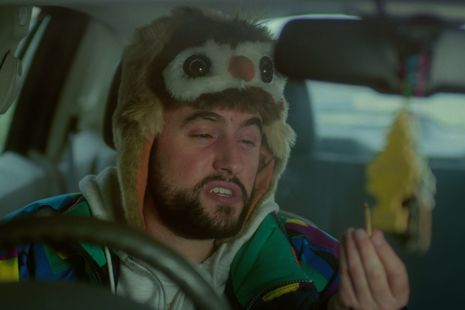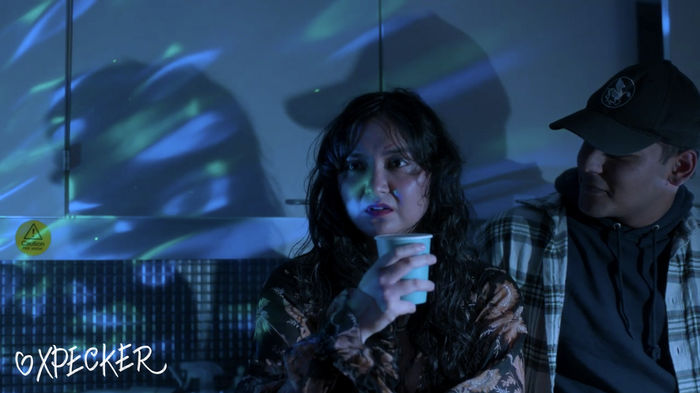Director David Campion on latest film Straight Through Crew
Jacob Smith interviews independent filmmaker David Campion on the process and inspiration behind his latest film, Straight Through Crew

Admittedly, I wasn’t familiar with David Campion’s works when I first watched his latest feature film, Straight Through Crew. Yet for the time I invested in Straight Through Crew, I was rewarded with an energetic, youthful, and unexpectedly touching experience. The film captures the struggles of adolescence, the invisible line between it and adulthood, and the insecurities surrounding abandonment and isolation which lie in the hearts of young adults. Exploring life in a small town through the eyes of drug-addicted Aden (Charles Craddock) and disillusioned Jamien (Jessica Pearce), Straight Through Crew has something I value above all else: heart. In between the main action are small scenes, expressions, and bouts of dialogue that reveal a deep and appreciated understanding of the complexities of modern relationships. A touching duologue delivered by Laura Hall (Lisane) and Ella Dunlop (Stephanie), reflecting on estrangement and that age-old feeling of wanting to break into a group whose exterior you can’t quite penetrate, convinced me that this movie had something meaningful to say. It was in such moments as these where it truly shined, wearing its heart on its sleeve with its cast of realistic and charming characters. To better understand the driving themes behind the film, I had the pleasure of speaking to David Campion.
Where did you find the inspiration for Straight Through Crew?
The main inspiration came from circumstance, which is unusual … but at this point I’d done my degree, made some films, moved to London, then back home from London, and I was skint. I remained there for well over 20 years which was not the idea. That was basically my twenties … The DJ we used in Straight Through Crew, his name is Tom Plank … he’s a local DJ, he did a series of nights over every working men’s club, every pub … and it culminated in a rave in a chicken shed. I realised … I’m onto something here, I’m not living in London with my filmmaker friends enjoying culture, I’m living this working class hedonistic rave lifestyle. And I think I could write about it.
“To understand a country’s cinema you need to see every region”
Why did you want to explore life in a small town specifically?
I think in cinema, the small town is [often] a catalyst for a protagonist to realise their life is too small, and the world is bigger [than it] … I kind of wanted to lend more nuance to it. A lot of the characters in the film are frustrated with their lives, a lot of them will move away, but many of that cast of characters won’t move away, and I don’t think there’s anything wrong with that. You get things like friendship, long term friendship … tight bonds. These are minute differences between town and city life that I wanted to depict. Regional filmmaking is so important, to understand a country’s cinema you need to see every region. A lot of French cinema is all over this [like] La Vie De Jesus (1997), a really nasty piece of French realism set in a regional town. It felt so different from the films I’d seen coming out of Paris. I realised that there’s definitely differences between regional and city filmmaking. I wasn’t showing him (my DoP) the best places, I was showing him a working men’s club, he hated it, he couldn’t make it look good, and I kind of loved that.
What was it like writing Aden, creating such an unlikable yet realistic member of the group?
In Andover, about 15 years ago, there was a slew of suicides of guys between 16 and 24 … in a very short period, throwing themselves off of a multi-story car park in town, and that multi-story car park looms heavy like a shadow over the town. What made these guys do that at that age? I was also living the Aden lifestyle … minus the class A drugs. I love writing unlikable characters; I don’t think many people are totally likable. It helps when you have an actor like Charles (Haddock), who is charming and absolutely glows in a close up … [his] smiles and little reactions make me love him, but he’s acting like a selfish prick, and getting to that point in his drug addiction where he’s just annoying people … he’s at that awkward stage, but how far away from potentially killing himself is he? For me it was just about writing an honest character … and believe me, Aden tested a lot of audiences. Most of our bad reviews were because people hated him.
When did you start to see the vision you’d cultivated come to life? During production, editing, or final release?
Definitely wasn’t on the first cut. Which no filmmaker’s ever going to say, because the first cut is really depressing. We lost very few scenes, so most of it was there, so after that first cut I definitely did see a vision, but it was like the worst version of that vision (chuckles). I did start to panic – I don’t think I was disciplined enough directing certain scenes, or got the best out of certain scenes, and all those scenes are in the first15 minutes … A lot of the time you’re just living with thinking “Jesus Christ I’ve put all my savings in a really shit film that’s not working”… there’s a lot of wear in that and it weighs heavy. But eventually it clicks and you find the best version of it.
“A lot of the time you’re just living with thinking “Jesus Christ I’ve put all my savings in a really shit film that’s not working””
What was your favourite scene from the film?
It was probably when Jamie and Aden escaped to the park, and had that long dialogue. That scene was written, rehearsed, then improvised, then rehearsed some more … but they (Charles Craddock & Jessica Pearce) gave so much of themselves to that … It was like a respite… it was also the last scene we shot. It was freezing cold, hence the mist just bellowing out of their mouths, so we did it in three straight takes. It was a nice end, I like making those sorts of decisions … Let’s have some confidence in what we’re doing and let it happen. I don’t think it’s a scene for everyone … I think when drama doesn’t work the way it should necessarily I think that triggers people … it’s on the line. But I kind of love that.
What’s next for you?
I’m writing an existential crime horror film about three stoner punks who rob their drug dealer … They think it will be a victimless crime and they want to break the monotony of their lives. The consequences of the robbery weigh heavy and it becomes more of an existential breakdown … seeing how it slowly ruins their lives. Slightly Lovecraftian. I’m looking at themes of capitalist realism … Capitalism as an entity that rules our lives, and I think how scary that can be, so I want to literalise that with a horror. And I want Scrubious Pip to be in it as the drug dealer, I think he’d be fantastic. Doomers, coming soon!.
It was a pleasure talking to David Campion, and I will be watching to see what he comes up with next. Straight Through Crew is on Amazon Prime, and I strongly encourage you to watch it.
 News / Cambridge academics sign open letter criticising research funding changes22 February 2026
News / Cambridge academics sign open letter criticising research funding changes22 February 2026 News / University Council rescinds University Centre membership20 February 2026
News / University Council rescinds University Centre membership20 February 2026 News / Supporters protest potential vet school closure22 February 2026
News / Supporters protest potential vet school closure22 February 2026 News / Hundreds of Cambridge academics demand vote on fate of vet course20 February 2026
News / Hundreds of Cambridge academics demand vote on fate of vet course20 February 2026 Comment / A tongue-in-cheek petition for gowned exams at Cambridge 21 February 2026
Comment / A tongue-in-cheek petition for gowned exams at Cambridge 21 February 2026








